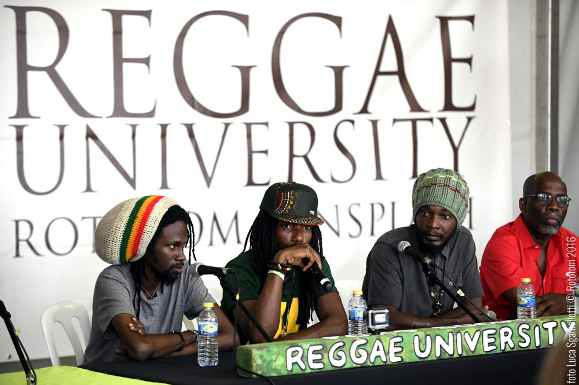Articles about reggae music, reviews, interviews, reports and more...
Freedom Sounds - Reggae as a space of Rebellion and Resistance

Freedom Sounds - Reggae as a space of Rebellion and Resistance
Rototom Sunsplash Reggae University day 4, Seriousness reasoning from Jamaica’s Reggae movement.
The panel hosted three current Jamaican Rasta artists: searing lyricist Kabaka Pyramid, his schoolmate from Kingston’s Campion College, Runkus and his Bebble Rock label-mate Koro Fyah.
The University’s fourth instalment updated the politically conscious themes of the prior day's chat with Pablo Moses for the younger generation. The panel hosted three current Jamaican Rasta artists: searing lyricist Kabaka Pyramid, his schoolmate from Kingston’s Campion College, Runkus and his Bebble Rock label-mate Koro Fyah. They engaged with two Jamaican intellectuals from different spaces: Rasta bookseller I Nation and UWI's Dr Dennis Howard (hitherto a vocal contributor from the floor).
The jam-packed table spoke before a capacity crowd for a dense 2-hour discourse. Chair Ellen Koehlings began by sharing the news that graphic artist Michael Thompson, who designed the Reggae University logo, had died of a stroke, so this session was “livicated to him”.

The festival’s 2016 motto is Reggae For Freedom and all guests ruminated on the concept. I Nation stated that “Reggae comes from Rastafari. Music with a mission to free up mankind”. Dr Howard expanded on this, saying all music is liberating yet reggae takes liberation to a new level of consciousness “of self, the world and black social context.” Runkus, the son of the deejay Determine, tapped the mic to make a reggae heartbeat “We combine every sound to this heartbeat. It can fit on any type of music”.
Kabaka took the discussion inward. “My journey began with Rasta but branched out to yoga, Buddhism, Kemetic science. It showed me is freedom is internal. Free from negative impulse within yourself. Doing whatever you want isn't free – you’re a slave to negative impulses”.
“JA has a history of rebellion” said Koro Fyah “and this music is another manifestation.” Dr Howard traced the narrative of resistance in Jamaican music from plantation songs, through the news-carrying function of mento and even the titles of instrumentals by the Skatalites. “As the chains changed” summarised Runkus “so did the method of the music”. An audience member broke protocol by demanding to speak, saying “Reggae is expression of oppression from then till now!”
I Nation talked about his Inner City Dub reggae events in the heart of Jamaica’s political garrisons. “The youths there are not listening to Burning Spear, they listen to Alkaline or Kartel. Youths reign over each other by violence. Dancehall music aids and abets that culture.” Kabaka pointed out that he had seen some youths in the ghettos who listened to both dancehall and his music. “I grew up on Vybz Kartel,” said Runkus “But I have a level of consciousness to hear metaphor where they hear it as literal “Take up gun”. If I didn't listen to Kartel I wouldn't have the lyrics I have now. We took what they create and put the goodness in it.” He drew a parallel with Sly and Robbie taking the syn drum from disco and putting it to conscious music.
Kabaka recalled how his Christian upbringing initially made him feel afraid when he heard Bob Marley’s lyrics. Regular panellist Pier Tosi quoted Redemption Song asking the artists what they saw as today’s “mental slavery”. Koro Fyah suggested the Jamaican fashion for skin bleaching to lighten the complexion. Kabaka proposed “ignorance” citing how he was banned from Campion College because the prestigious Catholic school didn’t like his dreadlocks. Runkus explained that by his attendance a few years later the rules had relaxed.
When questions opened to the floor, the speakers fielded them on weighty topics such as slavery reparations, their commitment to both Rasta and non-Rasta causes, and whether violence was justifiable in self-defence. The toughest question came, naturally, from Dr Howard’s UWI colleague Professor Carolyn Cooper, who upbraided conscious artists who call out women for bleaching, yet feature light skinned models in their videos. Kabaka gave the even-handed answer that a lot of it was down to the individual but supported the need for a change in how complexion is viewed in a class divided society. The session ended to heartfelt applause.
Read more about this topic
Comments actually desactivated due to too much spams
Browse by categories
Recommended Articles
Latest articles
Recently addedView all
© 2007-2026 United Reggae. All Rights Reserved. Reproduction in whole or in part is prohibited. Read about copyright
Terms of use | About us | Contact us | Authors | Newsletter | A-Z














